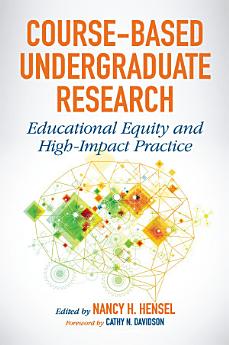Course-Based Undergraduate Research: Educational Equity and High-Impact Practice
Nancy H. Hensel
Jul 2023 · Taylor & Francis
Ebook
264
Pages
family_home
Eligible
info
reportRatings and reviews aren’t verified Learn More
About this ebook
Co-published with the Council on Undergraduate Research Undergraduate research has long been recognized as a high-impact practice (HIP), but has unfortunately been offered only to juniors and seniors, and to very few of them (often in summer programs). This book shows how to engage students in authentic research experiences, built into the design of courses in the first two years, thus making the experience available to a much greater number of students.Research that is embedded in a course, especially general education courses, addresses the issue of how to expand undergraduate research to all students. Research has shown that students who have early experiences in undergraduate research are more likely to pursue further research prior to and after graduation. This is also an issue of social justice because it makes the benefits of undergraduate research available to students who must work during the academic year and in the summer. It is widely accepted that the skills developed through undergraduate research help prepare students for their future careers.The book addresses all aspects of the topic, including:- What are appropriate expectations for research in the first two years- How to design appropriate course-based research for first- and second-year students- How to mentor a class rather than individual students- How students can disseminate the results of their research- Possible citizen-science projects appropriate for the first and second years- Providing additional resources available to support course-based research in the first two yearsDesigned for faculty at four-year and two-year colleges – and including examples from the sciences, the social sciences, and the humanities – the strategies and methods described can be adapted to disciplines not specifically mentioned in the book.Many faculty are hesitant to engage first and second year students in undergraduate research because they worry students don’t know enough to conduct authentic research in their discipline, because they worry about the time it will take to develop activities for these students, and because they wonder how they can mentor a whole class of students doing research. The authors have successfully dealt with these issues, and provide examples of how it’s done.
About the author
Nancy Hensel has been a faculty member, Dean, Provost, and University President. She served as Executive Officer of the Council of Undergraduate Research for seven years. In that role she served as Co-PI for several National Science Foundation grants to assist colleges in developing undergraduate research programs. She has written or edited a variety of books about undergraduate research, including Course-Based Undergraduate Research (Stylus, 2018); Transformative Research at Predominately Undergraduate Institutions with Kerry K. Karukstis (CUR, 2007) and Faculty Support and Undergraduate Research: Innovations in Faculty Role Definition, Workload, and Reward with Elizabeth L. Paul (CUR, 2012) She co-edited two monographs on undergraduate research that specifically address student research at community colleges. She also has given many speeches on undergraduate research and is a recognized national and international leader on this topic. Cathy N. Davidson is Distinguished Professor and Founding Director of the Futures Initiative at the Graduate Center, City University of New York. She is the author of many books, most recently, The New Education: How to Revolutionize the University to Prepare Students for a World in Flux (Basic Books, 2017). She was appointed by President Obama to the National Council on the Humanities (2011-2017) and serves on the Board of Directors of Mozilla. She Is the 2016 recipient of the Ernest J. Boyer Award for significant contributions to higher education awarded by The New American Colleges and Universities.
Rate this ebook
Tell us what you think.
Reading information
Smartphones and tablets
Install the Google Play Books app for Android and iPad/iPhone. It syncs automatically with your account and allows you to read online or offline wherever you are.
Laptops and computers
You can listen to audiobooks purchased on Google Play using your computer's web browser.
eReaders and other devices
To read on e-ink devices like Kobo eReaders, you'll need to download a file and transfer it to your device. Follow the detailed Help Center instructions to transfer the files to supported eReaders.






